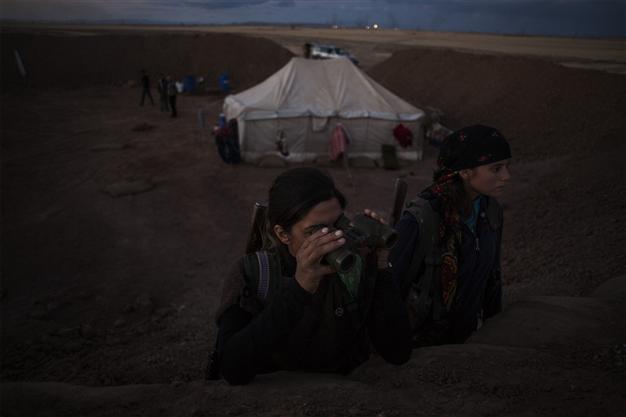Kurdish militants in Syria rout jihadists on Iraq border, seize crossing: Activists
DAMASCUS - Agence France-Presse

A fighter of the Kurdish People’s Defense Units (YPG) looks through binoculars behind a fortified wall as she looks for activities by Jabat al-Nusra opposition on Oct. 20 in the Kurdish town of Derik (al-Malikiyah in Arabic), in the northeastern Hasakeh governorate on the border with Turkey and Iraq. AFP photo
Fierce clashes raged on Oct. 26 after Syrian Kurds seized from jihadists a crossing on the Iraqi border, a key supply route for weapons and fighters in the 31-month war, activists said.
U.N. and Arab League envoy Lakhdar Brahimi meanwhile was due to visit Iran as he presses efforts to build a consensus for a Geneva conference aimed at ending the conflict that has killed tens of thousands.
Fighters from both sides were killed in the border clashes, which came a day after Syria's government and its opponents traded blame for a car bomb attack on a mosque that left dozens dead.
The People’s Defense Units (YPG) "took control of the Al-Yaarubia border crossing with Iraq at dawn after clashes with the Islamic State in Iraq and the Levant, the Al-Nusra Front and other rebels," the Syrian Observatory for Human Rights said, citing activists.
The Kurds have been struggling to carve out an autonomous northeastern region similar to one in northern Iraq, further complicating the Syrian war.
Rebels fighting to overthrow President Bashar al-Assad have increasingly turned their guns on each other in the past few months, with jihadists clashing with the mainstream Free Syrian Army in the north, where the rebels control vast swathes of territory.
The seizure of the border post was another reported blow for the Islamists after Syrian state television said on Oct. 25 that Al-Nusra's leader, Abu Mohammed al-Jawlani, had been killed, but the al-Qaeda-linked group said he was in good health.
The conflict flared when opponents of Assad took up arms in response to his forces' brutal crackdown on peaceful Arab Spring-inspired protests that erupted in March 2011.
More than 115,000 people are estimated to have been killed, millions have been uprooted from their homes, and tens of thousands trapped by the relentless fighting.
The fighting comes a day after a car bomb outside a mosque in Suq Wadi Barada, a town near Damascus, killed at least 40 people and wounded dozens more, according to the Observatory.
State news agency SANA said "the car exploded while the terrorists were packing it with explosives," using the regime term for forces fighting to oust it.
The opposition National Coalition blamed the regime for the "massacre" caused by what it said were two car bombs placed outside the Osama Bin Zeid mosque.
Elsewhere an army ambush killed about 24 rebels on the outskirts of Damascus, said the Observatory. SANA put the toll at 40.
The army has closed in on Eastern Ghouta, a ring of suburbs besieged for months, which was targeted in an August chemical attack that killed hundreds of people and almost led to punitive US strikes.
U.N. and U.S. officials have expressed concern about Eastern Ghouta and other besieged Damascus suburbs, following reports of severe food shortages and rising malnutrition.
U.N. humanitarian chief Valerie Amos called on the Security Council to put "sustained pressure" on Syria to allow access to some 2.5 million trapped civilians.
The Observatory described a similarly dire situation in the central city of Homs, where it said some 3,000 civilians were trapped in an area sealed off by regime forces for more than a year.
